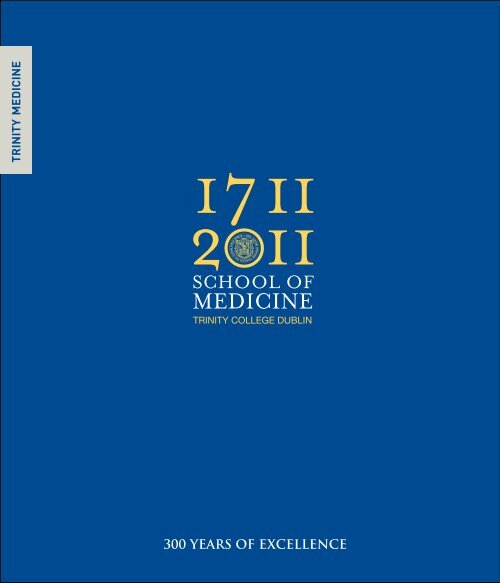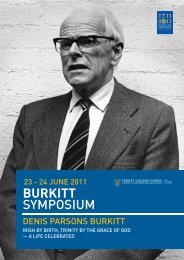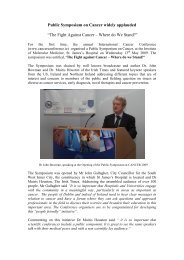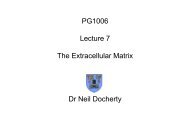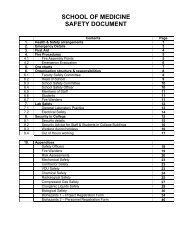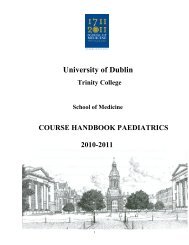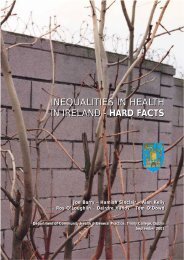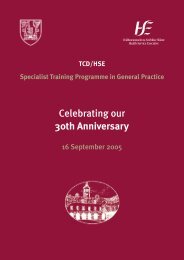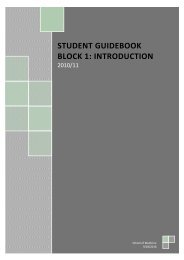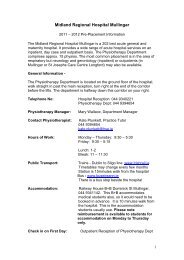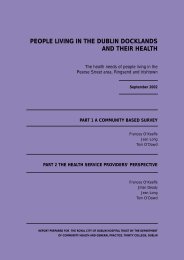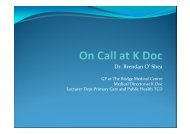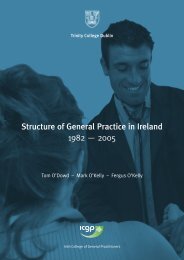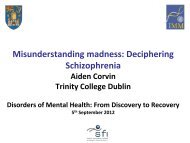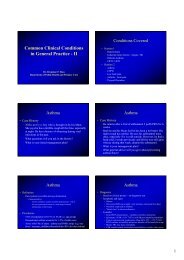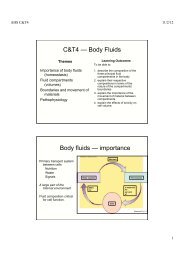Brochure "Trinity Medicine: 1711-2011" (PDF 681kB) - School of ...
Brochure "Trinity Medicine: 1711-2011" (PDF 681kB) - School of ...
Brochure "Trinity Medicine: 1711-2011" (PDF 681kB) - School of ...
Create successful ePaper yourself
Turn your PDF publications into a flip-book with our unique Google optimized e-Paper software.
TRINITY MEDICINE<br />
TRINITY COLLEGE DUBLIN<br />
300 YEARS OF EXCELLENCE
TRINITY MEDICINE POISED<br />
FOR FURTHER SUCCESS<br />
In collaboration with the teaching hospitals and primary<br />
care practices the <strong>School</strong> <strong>of</strong> <strong>Medicine</strong> will facilitate, foster<br />
and provide pr<strong>of</strong>essional training <strong>of</strong> medical students to the<br />
highest international standards in education and research.<br />
<br />
For centuries, <strong>Trinity</strong> medics have contributed<br />
to medical education and practice around<br />
the world. William Stokes and Robert<br />
Graves and other famous physicians were<br />
clinical researchers <strong>of</strong> their day. They made<br />
observations, they wrote them up, they<br />
published them, they treated their patients,<br />
and they taught their students. These were<br />
the leaders, and we, at the <strong>School</strong> <strong>of</strong> <strong>Medicine</strong>,<br />
intend to preserve their legacy <strong>of</strong> preparing<br />
exceptional doctors who can lead the medical<br />
pr<strong>of</strong>ession in the 21st century.<br />
I firmly believe that it is our responsibility to<br />
ensure that excellence in medical education<br />
and research at <strong>Trinity</strong> has real impact on the<br />
lives <strong>of</strong> patients. In our <strong>School</strong> and teaching<br />
hospitals, with their public service ethos,<br />
we are extremely fortunate to have worldclass<br />
doctors who are committed to making<br />
a difference. I am excited about the fantastic<br />
opportunities we have with such talent.<br />
Today, <strong>Trinity</strong>’s discoveries in the area<br />
<strong>of</strong> immunology and how these might be<br />
applied in the treatment <strong>of</strong> poverty-related<br />
diseases constitute some <strong>of</strong> the most<br />
important medical research currently<br />
being undertaken anywhere in the world.<br />
Groundbreaking research in lung cancer and<br />
eczema published in premier league journals<br />
are other examples <strong>of</strong> research that will help<br />
improve and save the lives <strong>of</strong> many.<br />
I am committed to building on our strong<br />
traditions combined with latest achievements<br />
to further strengthen the <strong>School</strong>’s<br />
international standing, one that ranks among<br />
the best in the world. And the Tercentenary in<br />
2011 provides, I think, the stimulus to take the<br />
necessary actions to achieve our ambitious<br />
goals.<br />
Plans for the <strong>School</strong> are not just about<br />
building buildings. What is important is the<br />
activity that takes place inside the buildings<br />
to provide high quality education. The key task<br />
is continuing to attract top academics to help<br />
us leverage the <strong>School</strong>’s existing strengths<br />
and to enhance other areas where we can<br />
have major impact.<br />
To do this, we need the support and<br />
involvement <strong>of</strong> a wider community and we<br />
hope that our alumni can lead the way. The<br />
Tercentenary Board that includes outstanding<br />
<strong>Trinity</strong> alumni and supporters are guiding us<br />
in our development efforts.<br />
I look forward to interacting with all the<br />
stakeholders who deeply care about the<br />
<strong>School</strong>’s progress. I invite you to engage<br />
with us as we plan for our exciting future<br />
and make our Tercentenary a real cause for<br />
celebration.<br />
Pr<strong>of</strong>essor Dermot Kelleher MD,<br />
FRCP, FRCPI, F Med Sci<br />
Head <strong>of</strong> the <strong>School</strong> <strong>of</strong> <strong>Medicine</strong><br />
Vice Provost <strong>of</strong> Medical Affairs<br />
1
A PROUD HERITAGE INSPIRING EXCELLENCE<br />
<strong>Trinity</strong> College Dublin <strong>School</strong> <strong>of</strong> <strong>Medicine</strong> is a unique institution, which is<br />
almost 300 years old. It has a proud tradition <strong>of</strong> scholarship and research<br />
and has made a significant contribution to development <strong>of</strong> medicine.<br />
<strong>1711</strong> - 2011<br />
<strong>1711</strong><br />
First medical school building opened on<br />
August 16. The building stood on a site<br />
now occupied by the Berkeley Library.<br />
1713<br />
Death <strong>of</strong> Sir Patrick Dun, a leading<br />
physician in Dublin and former<br />
President <strong>of</strong> the College <strong>of</strong> Physicians<br />
<strong>of</strong> Ireland. He left a substantial bequest<br />
part <strong>of</strong> which was used to support the<br />
appointment <strong>of</strong> three pr<strong>of</strong>essors.<br />
1757<br />
Rotunda Hospital, the first charitable<br />
maternity hospital in these islands,<br />
opened.<br />
1761<br />
George Cleghorn appointed Pr<strong>of</strong>essor <strong>of</strong><br />
Anatomy and Chirurgery. He is credited<br />
with the first description <strong>of</strong> infectious<br />
hepatitis.<br />
1813<br />
James Macartney appointed Pr<strong>of</strong>essor<br />
<strong>of</strong> Anatomy and Chirurgery. He helped<br />
establish the fame <strong>of</strong> the medical<br />
school and he had a major influence on<br />
students such as Stokes, Graves and<br />
Corrigan.<br />
1825<br />
Building <strong>of</strong> a new medical school known<br />
as Macartney’s Medical <strong>School</strong> at the<br />
west end <strong>of</strong> College.<br />
1826<br />
Coombe Lying-In Hospital founded.<br />
<br />
1827<br />
Robert James Graves appointed<br />
Pr<strong>of</strong>essor <strong>of</strong> the Institutes <strong>of</strong> <strong>Medicine</strong><br />
(physiology/pathology). Graves achieved<br />
renown on both sides <strong>of</strong> the Atlantic<br />
as a clinical teacher as well as for his<br />
description <strong>of</strong> hyperthyroidism.<br />
William Montgomery appointed first<br />
Pr<strong>of</strong>essor <strong>of</strong> Midwifery (obstetrics).<br />
Montgomery wrote a classic book on<br />
pregnancy and delivery in 1837.<br />
1832<br />
Sir Patrick Dun’s Hospital established<br />
as a teaching hospital with funds<br />
derived from the Sir Patrick Dun’s<br />
bequest.<br />
1840<br />
William Stokes elected Regius<br />
Pr<strong>of</strong>essor <strong>of</strong> Physic. He is<br />
acknowledged internationally as one <strong>of</strong><br />
the founders <strong>of</strong> cardiology.<br />
1849<br />
Robert William Smith appointed<br />
Pr<strong>of</strong>essor <strong>of</strong> Surgery. He described<br />
Smith’s fracture <strong>of</strong> the wrist and he<br />
wrote the first detailed description <strong>of</strong><br />
neur<strong>of</strong>ibromatosis.<br />
1864<br />
Work began on erecting several new<br />
buildings for the medical school. The<br />
work proceeded over 30 years and<br />
resulted in the fine range <strong>of</strong> buildings<br />
now facing College Park on the west<br />
side.<br />
Print by Tudor (1753)<br />
<strong>of</strong> the Library, showing<br />
the Anatomy House<br />
at the end <strong>of</strong> the<br />
colonnade to the right<br />
<strong>of</strong> the picture<br />
1870<br />
Diploma <strong>of</strong> State <strong>Medicine</strong> (preventative<br />
medicine) established. It was the first in<br />
Ireland and Great Britain.<br />
1873<br />
Edward Hallaran Bennett elected<br />
Pr<strong>of</strong>essor <strong>of</strong> Surgery. He is remembered<br />
for his description <strong>of</strong> Bennett’s fracture<br />
<strong>of</strong> the thumb.<br />
1883<br />
Daniel John Cunningham appointed<br />
Pr<strong>of</strong>essor <strong>of</strong> Anatomy and Chirurgery.<br />
His anatomy textbooks were used<br />
widely and for a considerable period <strong>of</strong><br />
time.<br />
1895<br />
Chair <strong>of</strong> Pathology established.<br />
1912<br />
Bicentenary celebrations with guests<br />
from over one hundred universities<br />
and medical organisations worldwide.<br />
Several distinguished guests including<br />
Sir William Osler received honorary<br />
degrees.<br />
1913<br />
First woman to graduate in medicine in<br />
<strong>Trinity</strong>.<br />
1914-18<br />
Sixty graduates <strong>of</strong> the <strong>School</strong> <strong>of</strong> Physic<br />
lost their lives and many more were<br />
wounded in the Great War.<br />
1922<br />
Alexander Charles O’Sullivan appointed<br />
first Pr<strong>of</strong>essor <strong>of</strong> Pathology.<br />
Chair <strong>of</strong> Physiology established.<br />
1936<br />
Denis Burkitt graduated. He would<br />
become famous for his work on<br />
Burkitt’s Lymphoma.<br />
1937<br />
William Hayes, who would become<br />
one <strong>of</strong> the leading geneticists <strong>of</strong> the<br />
twentieth century, graduated.<br />
1944<br />
Department <strong>of</strong> Social <strong>Medicine</strong><br />
established.<br />
1950<br />
Work begins on the Moyne Institute <strong>of</strong><br />
Preventative <strong>Medicine</strong>. One wing would<br />
house the Department <strong>of</strong> Bacteriology<br />
and the other accommodate the<br />
Department <strong>of</strong> Social <strong>Medicine</strong>.<br />
1959<br />
W. J. E. Jessop was appointed dean<br />
<strong>of</strong> the medical school and he led a<br />
major reform <strong>of</strong> the school and its<br />
relationship with its teaching hospitals<br />
– Dr. Steevens’ Hospital (1720), Mercer’s<br />
Hospital (1734), Meath Hospital (1753),<br />
Sir Patrick Dun’s Hospital (1810),<br />
Harcourt Street Hospital (1821), Baggot<br />
Street Hospital (1832) and the Adelaide<br />
Hospital (1839).<br />
1960<br />
Robert Steen <strong>of</strong> the National Children’s<br />
Hospital, Harcourt Street, was<br />
appointed first Pr<strong>of</strong>essor <strong>of</strong> Paediatrics.<br />
1961<br />
Formation <strong>of</strong> the Federated Dublin<br />
Voluntary Hospitals. The seven teaching<br />
hospitals associated with <strong>Trinity</strong> were<br />
brought together under the control <strong>of</strong><br />
a Central Council on which the College<br />
was represented.<br />
1962<br />
Chair <strong>of</strong> Pharmacology established.<br />
1966<br />
John Bonnar appointed first full<br />
time Chair <strong>of</strong> Obstetrics and<br />
Gynaecology.<br />
1967<br />
George Fegan appointed first full time<br />
Pr<strong>of</strong>essor <strong>of</strong> Surgery. He became<br />
famous for his pioneering work on<br />
varicose veins. He established a<br />
Department <strong>of</strong> Surgery in Sir Patrick<br />
Dun’s Hospital.<br />
General Practice student attachment<br />
scheme set up by Pr<strong>of</strong>essor James<br />
McCormick.<br />
1969<br />
Peter Beckett appointed first Pr<strong>of</strong>essor<br />
<strong>of</strong> Psychiatry, in association with St.<br />
Patrick’s Hospital.<br />
1970<br />
<strong>Trinity</strong> College entered into a teaching<br />
agreement with the Federated Dublin<br />
Voluntary Hospitals.<br />
1971<br />
St. James’s Hospital (formerly St.<br />
Kevin’s Hospital) established.<br />
Peter Gatenby appointed first full time<br />
Clinical Pr<strong>of</strong>essor. He developed a<br />
clinical medicine pr<strong>of</strong>essorial unit in the<br />
Meath Hospital.<br />
1973<br />
Temporary teaching centre for <strong>Trinity</strong><br />
College in St. James’s Hospital<br />
established.<br />
1975<br />
Tom Hennessy appointed first full time<br />
Pr<strong>of</strong>essor <strong>of</strong> Surgery.<br />
1977<br />
James McCormick appointed Pr<strong>of</strong>essor<br />
<strong>of</strong> Community Health.<br />
1980<br />
Construction <strong>of</strong> new teaching hospital<br />
at St. James’s Hospital begins.<br />
1983<br />
Closure <strong>of</strong> Mercer’s Hospital and the<br />
movement <strong>of</strong> the services to St. James’s<br />
Hospital. The other voluntary hospitals<br />
designated to move to St. James’s all<br />
closed within a few years.<br />
Sir Patrick Dun’s laboratory, which<br />
provided new research facilities at St.<br />
James’s Hospital, opened.<br />
1988<br />
Mercer’s Institute for Research<br />
on Ageing at St. James’s Hospital<br />
established.<br />
1993<br />
First Pr<strong>of</strong>essorship <strong>of</strong> General Practice<br />
established.<br />
1994<br />
<strong>Trinity</strong> Centre for Health Sciences<br />
at St. James’s Hospital, providing<br />
accommodation for academic<br />
departments and a medical library,<br />
opened.<br />
1998<br />
Closure <strong>of</strong> the Meath and Adelaide<br />
Hospitals and the National Children’s<br />
Hospital and their transfer to a new<br />
teaching hospital, the Adelaide &<br />
Meath Hospital, Incorporating the<br />
National Children’s Hospital (AMNCH)<br />
in Tallaght.<br />
2000<br />
The completion <strong>of</strong> the <strong>Trinity</strong> Centre for<br />
Health Sciences at AMNCH.<br />
2002<br />
Edward Kennedy Pr<strong>of</strong>essorship<br />
<strong>of</strong> Health Policy and Management<br />
established.<br />
2003<br />
The Durkan Laboratory for Research<br />
on Leukaemia and the Institute <strong>of</strong><br />
Molecular <strong>Medicine</strong> at St. James’s<br />
Hospital established.<br />
2005<br />
<strong>Trinity</strong> College Institute <strong>of</strong> Neuroscience<br />
(TCIN) established.<br />
2008<br />
Construction <strong>of</strong> a new biosciences<br />
building begins.<br />
2011<br />
Tercentenary.
TRINITY MEDICINE TODAY<br />
Pr<strong>of</strong>. Shaun McCann, Pr<strong>of</strong>essor<br />
<strong>of</strong> Academic <strong>Medicine</strong>, Director<br />
<strong>of</strong> Undergraduate Teaching and<br />
Learning<br />
Innovative, research-driven, interdisciplinary and international –<br />
that’s <strong>Trinity</strong> College <strong>School</strong> <strong>of</strong> <strong>Medicine</strong> as we prepare to celebrate<br />
the Tercentenary in 2011. We are striving to be in step with the latest<br />
advancements in medical education, science and practices to enhance<br />
the <strong>School</strong>’s position as a leader in Irish medicine and internationally.<br />
EDUCATION<br />
Key to the development <strong>of</strong> medical doctors <strong>of</strong><br />
the future is a familiarity and competence in<br />
clinical research. A critical component <strong>of</strong> this<br />
aspiration is the need to expose the future<br />
medical doctor to a significant investigational<br />
experience at an early stage in order to embed<br />
an understanding and appreciation <strong>of</strong> the<br />
relevance <strong>of</strong> research to healthcare delivery.<br />
Making research a consistent feature <strong>of</strong> the<br />
curriculum is an educational focus for the next<br />
five years.<br />
newly-developed courses are on <strong>of</strong>fer: MSc in<br />
Neuroscience, MSc in Cardiac Rehabilitation<br />
and Prevention; MSc in Physical Sciences in<br />
<strong>Medicine</strong>; MSc in Respiratory Physiotherapy;<br />
Intercalated MSc in Biomedical Sciences for<br />
Medical Students. Future plans include the<br />
introduction <strong>of</strong> a new MSc in Translational<br />
<strong>Medicine</strong>, MSc/Diploma in Biostatistics, MSc<br />
in Healthcare Infection Management and<br />
MSc in Clinical Microbiology and Molecular<br />
Diagnostics.<br />
RESEARCH<br />
Our academic leaders demonstrate excellence in scholarship by conducting, in<br />
collaboration with our teaching hospitals and primary care practices, groundbreaking<br />
research and publishing regularly in peer-reviewed journals.<br />
NEW TEST FOR EARLY DETECTION OF ALZHEIMER’S DISEASE<br />
New tests for the early detection <strong>of</strong> Alzheimer’s<br />
disease (AD) have been developed by Chair<br />
<strong>of</strong> Psychiatry, Pr<strong>of</strong>. Harald Hampel, based at<br />
the Adelaide & Meath Hospital, Incorporating<br />
the National Children’s Hospital at Tallaght.<br />
Pr<strong>of</strong>. Hampel and his team showed that<br />
the biomarker candidates p-tau231 and<br />
BACE1, thought to reflect key pathological<br />
mechanisms in AD, are dramatically increased<br />
in clinically at risk syndrome Mild Cognitive<br />
Impairment (MCI) and may thus be an early<br />
predictor <strong>of</strong> AD. The findings were recently<br />
published in the leading neuroscience journals<br />
‘Archives <strong>of</strong> General Psychiatry’, ‘Brain’, and<br />
‘Neurology’.<br />
UNDERGRADUATE<br />
The <strong>School</strong> has reduced the curriculum from<br />
Research degrees: The <strong>School</strong> <strong>of</strong> <strong>Medicine</strong> has<br />
nearly 200 students registered for postgraduate<br />
six to five years. The hybrid pedagogic model research degrees. Going forward we aim to<br />
now used involves lectures, problem-based increase access to postgraduate research<br />
Pr<strong>of</strong>. Harald Hampel Dr. Ross McManus Pr<strong>of</strong>. Con Feighery Pr<strong>of</strong>. Dermot Kelleher<br />
learning and small group case-based teaching. degrees, particularly for medical graduates,<br />
Students are introduced to clinical medicine and following on from the success <strong>of</strong> the<br />
NEW GENES FOR COELIAC DISEASE<br />
early in their first year and special attention<br />
is placed on the teaching <strong>of</strong> clinical skills in<br />
integrated PhD programmes in Molecular<br />
<strong>Medicine</strong> and Neuroscience we aim to broaden<br />
Coeliac disease is a condition in which the lining<br />
<strong>of</strong> the small intestine becomes damaged by<br />
prestigious journal ‘Nature Genetics 2007’.<br />
Follow-on studies have revealed a further 7<br />
a purpose-built laboratory. Bedside teaching the scope <strong>of</strong> PhD programmes on <strong>of</strong>fer in the<br />
exposure to dietary wheat and related cereals. susceptibility genes also published in ‘Nature<br />
Ireland has one <strong>of</strong> the highest incidences in the Genetics 2008’. <strong>Trinity</strong> researchers led by Dr.<br />
remains a major focus <strong>of</strong> the curriculum. <strong>School</strong>. In this regard, the first intake <strong>of</strong> PhD<br />
world. New studies involving the joint efforts Ross McManus with Pr<strong>of</strong>. Con Feighery, Pr<strong>of</strong>.<br />
students into the International Doctoral <strong>School</strong><br />
POSTGRADUATE<br />
<strong>of</strong> researchers in the UK, the Netherlands and Dermot Kelleher and other Irish researchers<br />
in Global Health (Indigo) led by <strong>Trinity</strong> College in<br />
Specialist MSc programmes: Currently 20 MSc<br />
<strong>Trinity</strong> College Dublin have resulted in the contributed to this<br />
collaboration with partner universities in Africa<br />
courses are <strong>of</strong>fered by the <strong>School</strong> <strong>of</strong> <strong>Medicine</strong><br />
identification <strong>of</strong> 8 new regions <strong>of</strong> the genome work which now<br />
and other countries will take place in 2009.<br />
which are linked to susceptibility to coeliac permits new insights<br />
to over 300 students. A major task is to develop<br />
Furthermore, work is underway to develop<br />
disease development. The first <strong>of</strong> these to be into the mechanism <strong>of</strong><br />
research capability <strong>of</strong> graduate students<br />
structured PhD programmes in Experimental<br />
discovered was the IL2 / IL21 region which the disease.<br />
consistent with the overall research strategy<br />
Cancer <strong>Medicine</strong> and in Community Health<br />
was the first identification <strong>of</strong> a non-MHC gene<br />
<strong>of</strong> the <strong>School</strong> <strong>of</strong> <strong>Medicine</strong>. The following<br />
and Primary Care.<br />
for this disease and was published in the<br />
4 5
THE IRISH LONGITUDINAL STUDY ON AGEING (TILDA)<br />
IRISH HEALTHCARE AWARD FOR STUDY ON DIABETES<br />
Pr<strong>of</strong>. Rose Anne Kenny<br />
Launched in November 2006, the Irish<br />
Longitudinal Study on Ageing (TILDA) is the<br />
most comprehensive study on ageing in Ireland.<br />
It will provide a study <strong>of</strong> a representative<br />
cohort <strong>of</strong> up to 10,000 Irish people over the<br />
age <strong>of</strong> 50 years charting their health, social<br />
and economic circumstances over a 10-year<br />
period. TCD is leading the study, which is<br />
being undertaken by a cross-institutional,<br />
multidisciplinary team <strong>of</strong> experts from<br />
several Irish academic institutions. A group<br />
<strong>of</strong> international scientists advises the TILDA<br />
investigators. Rose Anne Kenny, Pr<strong>of</strong>essor<br />
<strong>of</strong> Geriatric <strong>Medicine</strong>, Director <strong>of</strong> the Centre<br />
for Successful Ageing at St. James’s Hospital<br />
is TILDA’s principal investigator. Funding has<br />
been provided by the Atlantic Philanthropies<br />
and Irish Life.<br />
Diabetes is costing Ireland close to €600M<br />
each year, according to the CODEIRE study led<br />
by Pr<strong>of</strong>. John Nolan, consultant endocrinologist<br />
and head <strong>of</strong> the Metabolic Research Unit at<br />
St. James’s Hospital, which won the overall<br />
award at the Irish Healthcare Awards in 2007.<br />
Pr<strong>of</strong>. Nolan is the leading diabetes clinical<br />
researcher in Ireland. His team is studying the<br />
causes <strong>of</strong> severe insulin resistance, a major<br />
forerunner <strong>of</strong> type 2 diabetes, and recently<br />
published a paper on the phenomenon<br />
(previously unknown) <strong>of</strong> complete failure to<br />
respond to exercise training, in obese young<br />
people with type 2 diabetes. This research<br />
was published in the journal ‘Diabetologia’,<br />
and won the top prize for original research at<br />
the Irish Doctors Awards in 2007. Pr<strong>of</strong>. Nolan<br />
leads a cross-university diabetes research<br />
group within the new Dublin Centre for Clinical<br />
Research (DCCR), a partnership between<br />
<strong>Trinity</strong> College Dublin, University College<br />
Dublin and the Royal College <strong>of</strong> Surgeons in<br />
Ireland.<br />
Pr<strong>of</strong>. John Nolan<br />
“<br />
…My father left me but one legacy,<br />
the blessed gift <strong>of</strong> rising early.<br />
William Stokes (1804-1878), physician, Class <strong>of</strong> 1826.<br />
“<br />
Better to build a fence at the top <strong>of</strong> the cliff<br />
”<br />
than park an ambulance at the bottom.<br />
”<br />
Denis Burkitt (1911-1993), discovered, described and diagnosed Burkitt’s Lymphoma,<br />
Class <strong>of</strong> 1933.<br />
A NEW TEST FOR LUNG CANCER<br />
THE ECZEMA GENE<br />
Pr<strong>of</strong>. Joseph Keane<br />
Under the leadership <strong>of</strong> Pr<strong>of</strong>. Joseph Keane,<br />
Director <strong>of</strong> Research <strong>of</strong> the <strong>School</strong> <strong>of</strong> <strong>Medicine</strong>,<br />
the pulmonary group in St. James’s, and the<br />
<strong>School</strong> <strong>of</strong> <strong>Medicine</strong> have recently published a<br />
new test for lung cancer in ‘Nature <strong>Medicine</strong>’.<br />
This test was generated by using samples<br />
from over 100 patients with the disease.<br />
In collaboration with Boston University, the<br />
research team identified 80 genes whose<br />
expression in normal airway cells predicts<br />
lung cancer elsewhere in the lung with<br />
high accuracy. In fact, when combined with<br />
bronchoscopy, it improves the sensitivity <strong>of</strong><br />
that test to 95%.<br />
In 2007 ‘Nature Genetics’ Paediatric<br />
Dermatologist and TCD Associate Pr<strong>of</strong>essor <strong>of</strong><br />
Dermatology, Pr<strong>of</strong>. Alan Irvine, in conjunction<br />
with Pr<strong>of</strong>. Irwin McLean <strong>of</strong> the University <strong>of</strong><br />
Dundee’s College <strong>of</strong> <strong>Medicine</strong>, published<br />
findings on the genetic mutations associated<br />
with childhood eczema, providing a potential<br />
major breakthrough in the treatment <strong>of</strong><br />
eczema. “Having a filaggrin mutation confers<br />
a very high risk <strong>of</strong> eczema – a 45% chance<br />
with one filaggrin mutation and a 90% chance<br />
with two filaggrin mutation,” commented Pr<strong>of</strong>.<br />
Irvine. “This new research now provides a target<br />
for direct intervention and the development <strong>of</strong><br />
new therapeutic approaches.”<br />
Pr<strong>of</strong>. Alan Irvine<br />
6<br />
5<br />
7
PARTNERSHIPS<br />
Over the years the <strong>School</strong> <strong>of</strong> <strong>Medicine</strong> and its affiliated hospitals have produced major<br />
players <strong>of</strong> Irish medicine. Working closely with our colleagues in other academic<br />
institutions in Ireland and internationally is one <strong>of</strong> the underlying principles <strong>of</strong> the<br />
<strong>School</strong>’s operation today. Our academics collaborate with colleagues in Ireland and<br />
around the world in a wide range <strong>of</strong> areas. We are also participating in a number <strong>of</strong><br />
partnerships as an institution. Here are some examples.<br />
IRISH UNIVERSITIES & MEDICAL SCHOOLS CONSORTIUM<br />
In addition to TCD, the Irish Universities<br />
& Medical <strong>School</strong>s Consortium comprises<br />
the medical and dental schools in the three<br />
constituent universities <strong>of</strong> the National<br />
University <strong>of</strong> Ireland, University College<br />
Cork, University College Dublin and National<br />
University <strong>of</strong> Ireland Galway. There is a strong<br />
ethos in pioneering research and a commitment<br />
to education as the engine for development.<br />
INDIGO<br />
In collaboration with international partners,<br />
<strong>Trinity</strong> College Dublin is establishing the<br />
International Doctoral <strong>School</strong> in Global<br />
Health (Indigo) to provide interdisciplinary<br />
PhD training in Global Health to students in<br />
African and other universities. Indigo aims to<br />
build capacity in health systems by educating<br />
leaders in health research and by creating<br />
sustainable health research networks in sub-<br />
Saharan Africa. Start up funding has been<br />
provided by the Irish Government through<br />
Higher Education Authority and Irish Aid.<br />
<strong>Trinity</strong>’s partners in Indigo are:<br />
• Ibadan University, Nigeria<br />
• Makerere University, Uganda<br />
• University <strong>of</strong> Malawi, Malawi<br />
• Human Sciences Research Council,<br />
South Africa<br />
• Council on Health Research for<br />
Development, Switzerland<br />
• UK Cochrane Centre, Oxford, UK<br />
• Department <strong>of</strong> Global Health and Social<br />
<strong>Medicine</strong> and the Business <strong>School</strong> at<br />
Harvard University, USA<br />
• Mailman <strong>School</strong> <strong>of</strong> Public Health,<br />
Columbia University, USA<br />
Dr. Stanley Quek (M.B., M.A., 1970) is Singapore organiser <strong>of</strong> the Irish Universities & Medical <strong>School</strong>s<br />
Consortium, which recruits qualified Singapore applicants for all the Irish medical schools. Dr. Quek<br />
was the Republic <strong>of</strong> Ireland’s Honorary Consul General in Singapore, serving the Irish communities<br />
in Singapore, Brunei and Indonesia, before the Irish Embassy was established in May 2000 as a result<br />
<strong>of</strong> significant increases in Irish consular and trade activities. Dr. Quek is a member <strong>of</strong> the <strong>Trinity</strong><br />
Foundation Board and <strong>of</strong> the <strong>School</strong> <strong>of</strong> <strong>Medicine</strong> Tercentenary Board.<br />
Dr. Stanley Quek, with Provost Dr. John Hegarty and former Provost Dr. Thomas Mitchell, on the occasion <strong>of</strong><br />
Dr. Quek receiving 2007 <strong>Trinity</strong> College Dublin Alumni Award for outstanding contribution to the University.<br />
• Addis Ababa University, Ethiopia<br />
Pauline Byakika and Mohammed Lamorde were awarded the Marjorie and Norah Fenton<br />
Scholarship, which enables them to do a PhD in Clinical Pharmacology. The Scholarship<br />
was founded in 2006, through the Fair Wind Foundation, by a gift <strong>of</strong> Mr. & Mrs. Michael<br />
Jackson in memory <strong>of</strong> Mr. Jackson’s mother Marjorie and his aunt Norah, a graduate <strong>of</strong><br />
<strong>Trinity</strong>’s medical school. Norah Edith Fenton graduated with B.A. in 1923 and M.B., BCh.,<br />
B.A.O. in 1927.<br />
Dr. Mohammed Lamorde, Dr. Ceppie Merry (PhD supervisor) and Dr. Pauline Byakika.<br />
EUROLIFE<br />
The Eurolife Network <strong>of</strong> European Universities<br />
in Life Sciences has as its principle objectives<br />
the development <strong>of</strong> a pan-European vision<br />
for high level strategic cooperation, research<br />
and training activities. Apart from TCD, the<br />
network includes:<br />
• Leiden University Medical Center<br />
• University <strong>of</strong> Edinburgh<br />
• Université Louis Pasteur Strasbourg<br />
• Universitat de Barcelona<br />
• Georg-August-Universität Göttingen<br />
• Karolinska Institutet, Stockholm<br />
Signing <strong>of</strong> Memorandum <strong>of</strong><br />
Understanding between Makerere<br />
University, Uganda, and <strong>Trinity</strong><br />
College Dublin.<br />
L-R: Pr<strong>of</strong>. Nelson Sewankambo, Dean<br />
<strong>of</strong> <strong>Medicine</strong> at Makerere University;<br />
Dr. Ceppie Merry, <strong>School</strong> <strong>of</strong> <strong>Medicine</strong>;<br />
Pr<strong>of</strong>. Dermot Kelleher,<br />
Head <strong>of</strong> <strong>School</strong> <strong>of</strong> <strong>Medicine</strong>;<br />
Dr. John Hegarty, Provost.<br />
8<br />
7<br />
9
STUDENTS<br />
MOVE<br />
Pr<strong>of</strong>. Colm Ó’Moráin,<br />
Pr<strong>of</strong>essor <strong>of</strong> <strong>Medicine</strong>,<br />
Dean <strong>of</strong> Health Sciences<br />
While dealing with pressures <strong>of</strong> a medical student’s life, our students organise a range<br />
<strong>of</strong> activities aimed at giving back to the community and participate in <strong>Trinity</strong>’s various<br />
clubs and societies.<br />
ANNUAL MED DAY<br />
Over 500 medical and nursing students from<br />
<strong>Trinity</strong> College take to the streets <strong>of</strong> Dublin in<br />
November to raise money for TCD Med Day,<br />
MED DAY OUTREACH PROJECT<br />
a citywide event which aims to raise money<br />
and public awareness for facilities in Dublin<br />
hospitals.<br />
MOVE (Medical Overseas Voluntary Electives)<br />
is a charity run by 4th year medical students<br />
in <strong>Trinity</strong> College Dublin under the direction<br />
<strong>of</strong> the Dean <strong>of</strong> Health Sciences and Senior<br />
Clinical Staff in St. James’s and AMNCH<br />
hospitals. The members <strong>of</strong> MOVE raise money<br />
through street collections, bag packing,<br />
raffles, entertainment nights such as concerts,<br />
corporate donations and donations from the<br />
medical alumni. In the summer after 4th<br />
year, the MOVE members travel to hospitals<br />
in the developing world. The money raised is<br />
divided among the members and used to buy<br />
equipment, supplies or medications for these<br />
hospitals. MOVE members spend a month in<br />
these hospitals learning medicine and also<br />
helping to care for patients.<br />
The <strong>Trinity</strong> Access Programmes (TAP), in<br />
conjunction with the students <strong>of</strong> the fifth year<br />
TCD Med Day Committee hosted “Med Day<br />
Outreach Project”, a series <strong>of</strong> daylong clinical<br />
workshops for pupils studying in 20 <strong>of</strong> TAP’s link<br />
secondary schools. The outreach programme<br />
allows students studying in schools with low<br />
progression rates to third level, and in particular<br />
to university, the opportunity to spend a full day<br />
in <strong>Trinity</strong> College, giving them an insight into<br />
the physical, cultural and academic aspects <strong>of</strong><br />
college life. In 2007, 125 secondary students,<br />
15 secondary school teachers and 30 medicine<br />
undergraduate volunteers participated in the<br />
Med Day Outreach Project.<br />
TRINITY STUDENT MEDICAL JOURNAL<br />
<strong>Trinity</strong> Student Medical Journal (TSMJ) is<br />
a peer reviewed medical journal aimed at<br />
undergraduate health and natural sciences<br />
students. The aim <strong>of</strong> the journal is to<br />
encourage students to undertake and publish<br />
their research, as well as voicing their opinions<br />
and ideas. TSMJ publishes articles which<br />
reflect areas <strong>of</strong> medicine that students find<br />
interesting and pertinent to their development<br />
as doctors.<br />
“<br />
The <strong>School</strong> <strong>of</strong> <strong>Medicine</strong> is <strong>of</strong> particular importance to me as many <strong>of</strong> my family have been through it<br />
spanning over 100 years (including my grandfather and great-grandfather, both with the same name<br />
as mine!). <strong>Trinity</strong> provides a unique environment for studying medicine as it allows one not only to<br />
enhance passion for the course but also to immerse fully into the benefits <strong>of</strong> university life through the<br />
broad spectrum <strong>of</strong> sports clubs and societies that create a wonderful campus atmosphere.<br />
”<br />
Robbie Woods, finalist <strong>of</strong> <strong>Trinity</strong> Annual Fund 2007-2008 Student Awards, Class <strong>of</strong> 2010, with Provost John Hegarty.<br />
Dr. Robert Henry Woods (right), a <strong>Trinity</strong> graduate, Robbie Woods’s<br />
great grandfather (see opposite), was knighted for his contribution<br />
to medicine. He was president <strong>of</strong> the College <strong>of</strong> Surgeons around the<br />
200th anniversary <strong>of</strong> TCD medical school. He was also elected as an<br />
MP for TCD. He set up the <strong>Trinity</strong> College Endowment Fund, which<br />
subsequently became the <strong>Trinity</strong> Trust.<br />
Dr. Robert Rowan Woods (far right), a <strong>Trinity</strong> graduate,<br />
Robbie Woods’s grandfather, was secretary <strong>of</strong> the <strong>Trinity</strong> Trust.<br />
10` 11
TRINITY MEDICINE TOMORROW<br />
ACADEMIC MEDICAL CENTRE AND TRINITY<br />
PHASE II AT ST. JAMES’S AND AMNCH HOSPITALS<br />
Maintaining the reputation <strong>of</strong> the <strong>School</strong> <strong>of</strong> <strong>Medicine</strong> as a centre <strong>of</strong><br />
quality education and research means ongoing development. Our plan<br />
for 2007-2011 leading up to the Tercentenary will take our educational<br />
programmes to a higher, and a more international level.<br />
To achieve this we are planning to accomplish<br />
a number <strong>of</strong> priorities, including:<br />
• Development <strong>of</strong> innovative teaching<br />
programmes<br />
• Key appointments in Cancer, Infection &<br />
Immunity and Neurosciences<br />
• Establishment <strong>of</strong> strategic partnerships in<br />
Ireland and internationally<br />
• Facilities development:<br />
- A new building for the <strong>School</strong> <strong>of</strong><br />
<strong>Medicine</strong> on <strong>Trinity</strong> campus<br />
- <strong>Trinity</strong> Phase II research facilities in<br />
St. James’s Hospital<br />
- <strong>Trinity</strong> Phase II research facilities in<br />
AMNCH<br />
• Creating research capacity for <strong>Trinity</strong><br />
medical history collection<br />
The <strong>School</strong> <strong>of</strong> <strong>Medicine</strong> and our two main<br />
teaching hospitals, St. James’s and AMNCH,<br />
are reorganising into an Academic Medical<br />
Centre. The Academic Medical Centre<br />
would permit the hospitals to maximise<br />
their development as centres <strong>of</strong> knowledge<br />
generation and permit their appropriate<br />
integration into the knowledge economy. The<br />
development <strong>of</strong> such a system will also have<br />
significant impact on the quality <strong>of</strong> cutting edge<br />
tertiary and quaternary patient care. It provides<br />
a powerful partnership for development <strong>of</strong><br />
increased capacity in terms <strong>of</strong> physical facility<br />
and human resource infrastructure. Major<br />
developments in association with hospitals<br />
will be <strong>Trinity</strong> Phase II facilities for building up<br />
areas <strong>of</strong> excellence in translational research in<br />
conjunction with <strong>Trinity</strong> Biosciences Institute.<br />
AMNCH<br />
<strong>Trinity</strong> College Dublin<br />
St. James’s Hospital<br />
“<br />
Our greatest glory consists not in never<br />
falling, but in rising every time we fall.<br />
”<br />
Oliver Goldsmith (1730-1774), writer, poet, and physician, Class <strong>of</strong> 1752.<br />
Dr. Charles C. C. O’Morchoe (M.D., 1955) established a fellowship, which is endowed in perpetuity, for a student exchange<br />
programme between TCD <strong>School</strong> <strong>of</strong> <strong>Medicine</strong> and the University <strong>of</strong> Illinois College <strong>of</strong> <strong>Medicine</strong> at Urbana-Champaign. It is<br />
in memory <strong>of</strong> Dr. O’Morchoe’s wife Patricia Jean O’Morchoe (nee Richardson), a <strong>Trinity</strong> medical graduate (M.D., 1955), and<br />
also in honour <strong>of</strong> his two ancestors, both famous scientists and pr<strong>of</strong>essors at TCD. Charles and Patricia Jean were both on<br />
the faculty <strong>of</strong> TCD from 1957 to 1968. Dr. Charles O’Morchoe was elected a Fellow <strong>of</strong> TCD during that time. Subsequently<br />
he was a Pr<strong>of</strong>essor at the University <strong>of</strong> Maryland, Head <strong>of</strong> the Anatomy Department <strong>of</strong> Loyola University Stritch <strong>School</strong><br />
<strong>of</strong> <strong>Medicine</strong> and then Dean <strong>of</strong> the University <strong>of</strong> Illinois College <strong>of</strong> <strong>Medicine</strong> at Urbana-Champaign and now its Emeritus<br />
Dean and Pr<strong>of</strong>essor.<br />
Patricia Jean and Charles O’Morchoe.<br />
12 12<br />
13
BIOSCIENCES INSTITUTE<br />
TRINITY MEDICAL HISTORY COLLECTION<br />
A major Biosciences Institute underpinning<br />
our strategic health and translational<br />
research efforts is planned for the east side <strong>of</strong><br />
Pearse Street. This impressive structure will<br />
regenerate a currently unused space, bringing<br />
it firmly into the 21st century. The Biosciences<br />
Institute will redefine the scientific research<br />
landscape in <strong>Trinity</strong> College and for the first<br />
time create a meaningful consolidation <strong>of</strong><br />
activities not only in the biosciences, but<br />
also by extension in the information and<br />
communication technologies area, in natural<br />
sciences, in the social sciences and in the<br />
physical sciences. Creation and judicious<br />
population <strong>of</strong> a new Biosciences Institute will<br />
copper-fasten the College’s position as the<br />
leading scientific university in Ireland, and<br />
enhance our ability to execute world-leading<br />
research in those areas identified as core<br />
strengths within the College’s stated strategic<br />
plan.<br />
The <strong>School</strong> <strong>of</strong> <strong>Medicine</strong> expects to get a new<br />
home in the Biosciences Institute building,<br />
which is due to be built by 2011.<br />
The Tercentenary <strong>of</strong> the <strong>School</strong> <strong>of</strong> <strong>Medicine</strong><br />
will be marked in 2011. The <strong>School</strong> has<br />
played a central role in the golden age <strong>of</strong> Irish<br />
medicine. For three centuries, <strong>Trinity</strong> medics<br />
have contributed to medical education and<br />
practice around the world.<br />
The aim <strong>of</strong> creating research capacity for<br />
<strong>Trinity</strong> medical history collection is to explore<br />
in the national, European, imperial and global<br />
contexts <strong>Trinity</strong>’s contribution towards the<br />
world <strong>of</strong> medicine. Our manuscript, printed<br />
and material collections for the History <strong>of</strong><br />
<strong>Medicine</strong>, which date from the Middle Ages<br />
to the present day, are exceptional and await<br />
being explored.<br />
Triggered by the upcoming Tercentenary, the<br />
<strong>School</strong> <strong>of</strong> <strong>Medicine</strong> and the <strong>School</strong> <strong>of</strong> Histories<br />
and Humanities are collaborating in this area.<br />
The anniversary provides a perfect opportunity<br />
to scope <strong>Trinity</strong>’s vast collections, catalogue<br />
the records <strong>of</strong> <strong>Trinity</strong> <strong>School</strong> <strong>of</strong> <strong>Medicine</strong> and<br />
the Adelaide, Dr. Steevens’ and Meath hospital<br />
collections and to showcase some <strong>of</strong> the most<br />
valuable and important items in exhibitions,<br />
presentations and other events that will take<br />
place around the Tercentenary.<br />
Pr<strong>of</strong>. Davis Coakley is Pr<strong>of</strong>essor<br />
<strong>of</strong> Gerontology. He has a lifelong<br />
interest in medical history and is<br />
the author <strong>of</strong> a number <strong>of</strong> books<br />
on medical history, medicine and<br />
Irish literature.<br />
Mary Henry, (M.A., M.D., 1963) is chair <strong>of</strong> the TCD Association & Trust and a member <strong>of</strong> the board<br />
<strong>of</strong> <strong>Trinity</strong> Foundation. Mary Henry was elected to Seanad Eireann in 1993 and re-elected in 1997<br />
as an independent Senator to represent <strong>Trinity</strong>. She is deeply committed to improving healthcare,<br />
especially for women, and to encouraging women doctors to continue their pr<strong>of</strong>essional careers.<br />
Mary Henry received 2008 <strong>Trinity</strong> College Dublin Alumni Award for her tremendous contribution.<br />
Jeremy Swan was born in Sligo in 1922. He studied medicine in St. Thomas’s Hospital London, and<br />
he joined the staff <strong>of</strong> the Mayo Clinic in 1951. In 1965 he was appointed Pr<strong>of</strong>essor <strong>of</strong> <strong>Medicine</strong> at the<br />
University <strong>of</strong> California in Los Angeles and also Director <strong>of</strong> Cardiology at the Cedars/Sinai Medical<br />
Centre. There he established a world-famous centre for cardiology and he developed the Swan-Ganz<br />
catheter measuring pressures within the heart and surrounding vessels <strong>of</strong> critically ill patients. He<br />
died on February 7, 2005. Pr<strong>of</strong>. Swan and his wife Roma established a fund for teaching ethics to<br />
medical students in <strong>Trinity</strong> College.<br />
Roma and Jeremy Swan in <strong>Trinity</strong> in July 1996, when Jeremy received an honorary degree.<br />
14 15
SCHOOL OF MEDICINE<br />
AT A GLANCE<br />
• Founded in <strong>1711</strong><br />
L-R: David Lloyd (TCD Dean <strong>of</strong><br />
Research), Stanley Quek, Beulah<br />
Bewley, Dermot Kelleher, Adrian<br />
Hill, Dave Shanahan, Michael<br />
Asbury<br />
• Affiliated hospitals – St. James’s and Adelaide & Meath Hospital,<br />
Incorporating the National Children’s Hospital (AMNCH) –<br />
have strong public service ethos<br />
• Major figures <strong>of</strong> Irish medicine came through TCD and its<br />
affiliated hospitals<br />
• Currently 640 students from 35 countries<br />
• The number <strong>of</strong> EU students increased to over 100 in the first year<br />
TERCENTENARY BOARD<br />
• Dr. Michael Asbury, Non-executive<br />
Chairman <strong>of</strong> Photopharmica Ltd.<br />
• Dr. Dame Beulah Bewley, Past President<br />
<strong>of</strong> the Medical Women’s Federation,<br />
former member <strong>of</strong> the General Medical<br />
Council UK<br />
• Pr<strong>of</strong>. Adrian Hill, Pr<strong>of</strong>essor <strong>of</strong> Human<br />
Genetics, Wellcome Trust Principal<br />
Research Scientist, Oxford University<br />
• Mr. Fergus Hoban, Chief Executive Officer,<br />
Touchstone<br />
• Dr. Stanley Quek, Chief Executive <strong>of</strong><br />
Frasers Property Group<br />
• Mr. Dave Shanahan, Chief Executive<br />
Officer, Charter Medical<br />
• Pr<strong>of</strong>. Shaun McCann, Medical Association<br />
President, Director <strong>of</strong> Undergraduate<br />
Teaching and Learning, Pr<strong>of</strong>essor <strong>of</strong><br />
Academic <strong>Medicine</strong><br />
• Pr<strong>of</strong>. Dermot Kelleher, Head <strong>of</strong> the <strong>School</strong><br />
<strong>of</strong> <strong>Medicine</strong>, Vice Provost <strong>of</strong> Medical<br />
Affairs<br />
TRINITY RESEARCH UNITS &<br />
CONSORTIA<br />
• Institute <strong>of</strong> Neuroscience<br />
(TCIN)<br />
• Institute <strong>of</strong> Molecular <strong>Medicine</strong><br />
(IMM) inc. John Durkan<br />
Research Labs<br />
• Institute <strong>of</strong> Cardiovascular<br />
Science<br />
• <strong>Trinity</strong> College Centre for<br />
Immunology<br />
• <strong>Trinity</strong> Consortium on Ageing<br />
• Centre for Global Health<br />
TRINITY TEACHING HOSPITALS<br />
• St. James’s Hospital<br />
• AMNCH at Tallaght<br />
ACADEMIC UNITS<br />
Anatomy<br />
Clinical <strong>Medicine</strong><br />
Clinical Microbiology<br />
Haematology<br />
Health Policy & Management<br />
Histopathology & Morbid Anatomy<br />
Immunology<br />
Medical Gerontology<br />
Obstetrics & Gynaecology<br />
Paediatrics<br />
Pharmacology & Therapeutics<br />
Physiology<br />
Psychiatry<br />
Public Health and Primary Care<br />
Surgery<br />
Occupational Therapy<br />
Physiotherapy<br />
Radiation Therapy<br />
ASSOCIATED RESEARCH<br />
ORGANISATIONS<br />
• Molecular <strong>Medicine</strong> Ireland<br />
(MMI)<br />
ASSOCIATED TEACHING<br />
HOSPITALS<br />
• Naas General Hospital<br />
• Coombe Women’s<br />
Hospital<br />
• Rotunda Hospital Dublin<br />
• Royal Victoria Eye & Ear<br />
Hospital<br />
• St. Patrick’s Hospital Dublin<br />
17<br />
FOR MORE INFORMATION<br />
<strong>School</strong> <strong>of</strong> <strong>Medicine</strong><br />
Chemistry Building<br />
<strong>Trinity</strong> College<br />
Dublin 2<br />
Phone 00353 1 896 1636<br />
Fax 00353 1 671 3956<br />
Web<br />
www.medicine@tcd.ie<br />
16<br />
medicine@tcd.ie
18` 19
22 23


